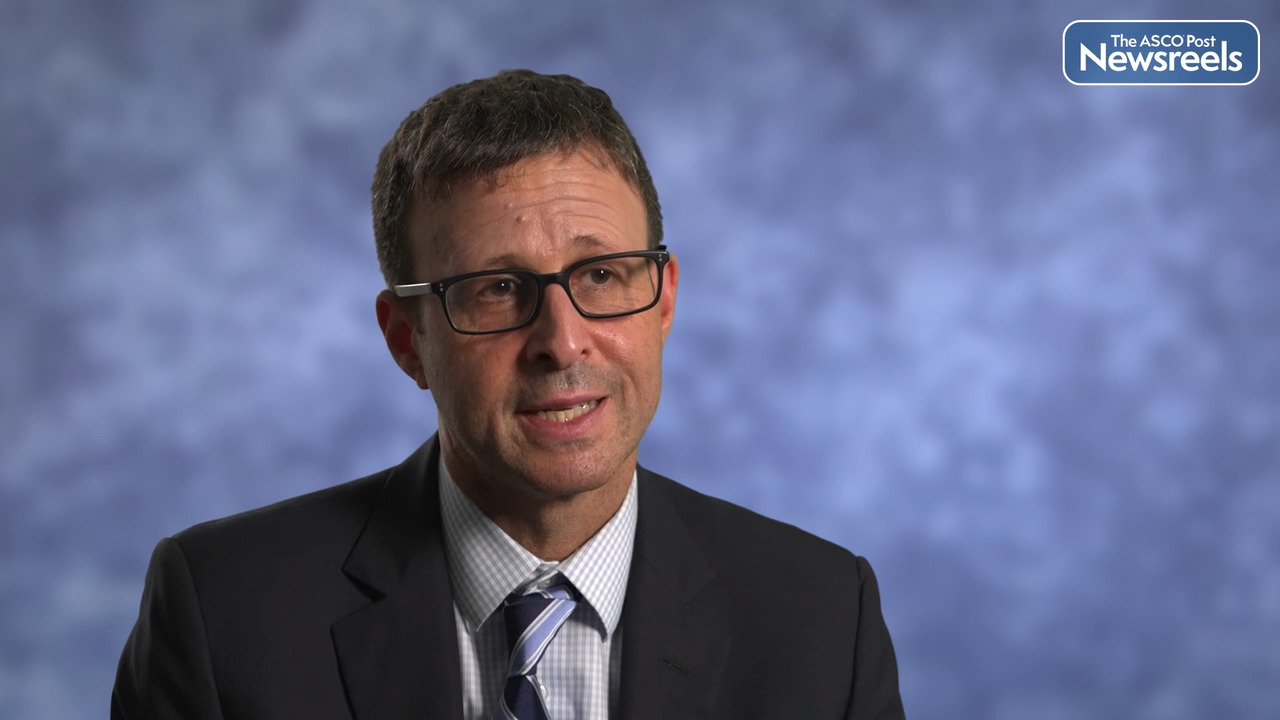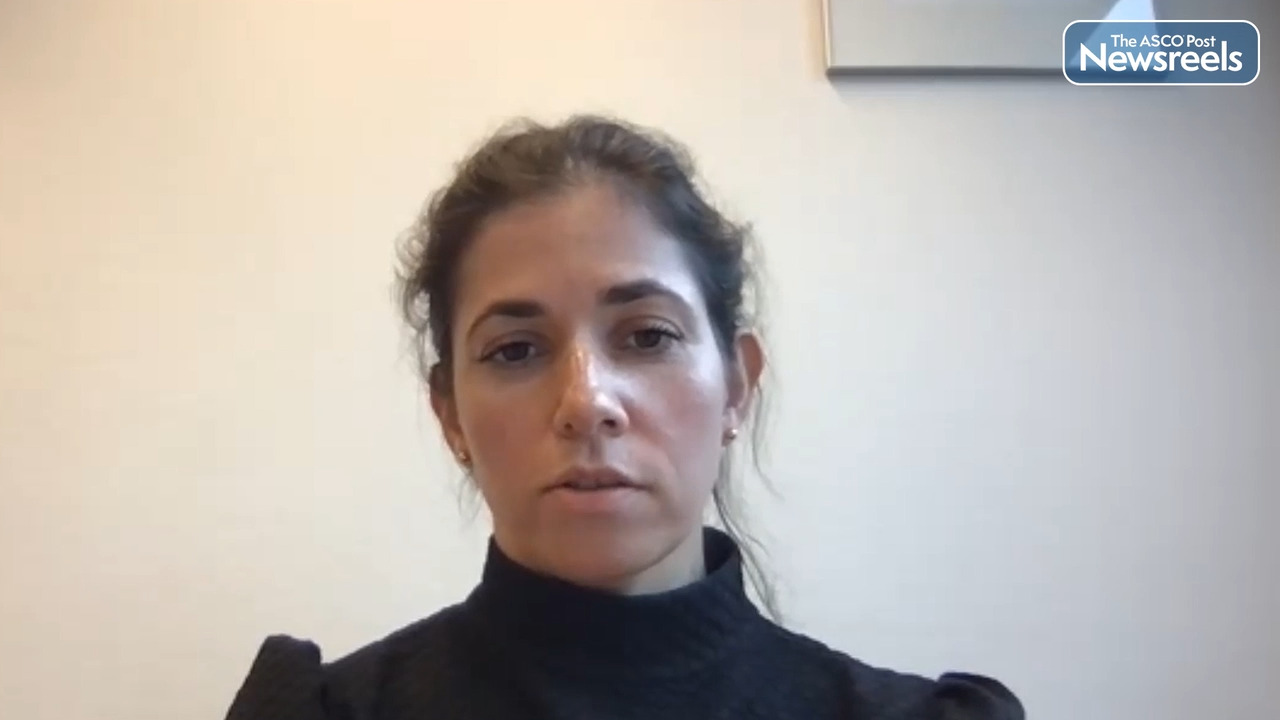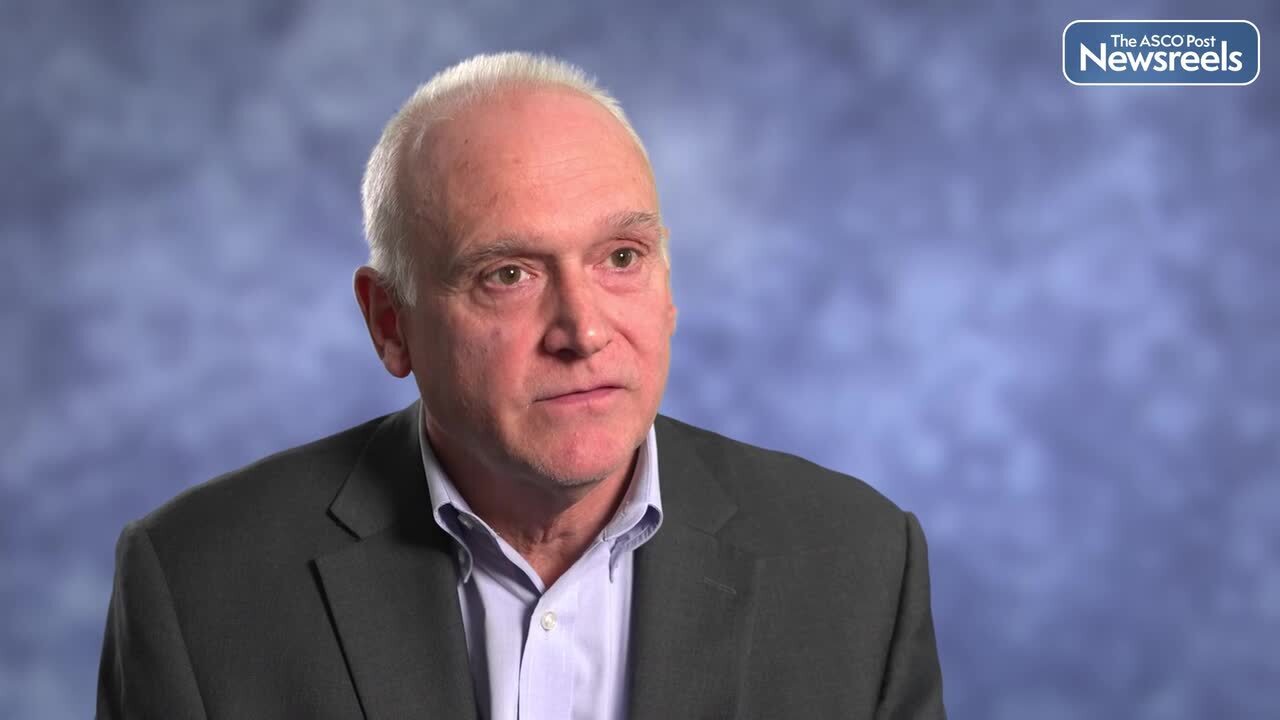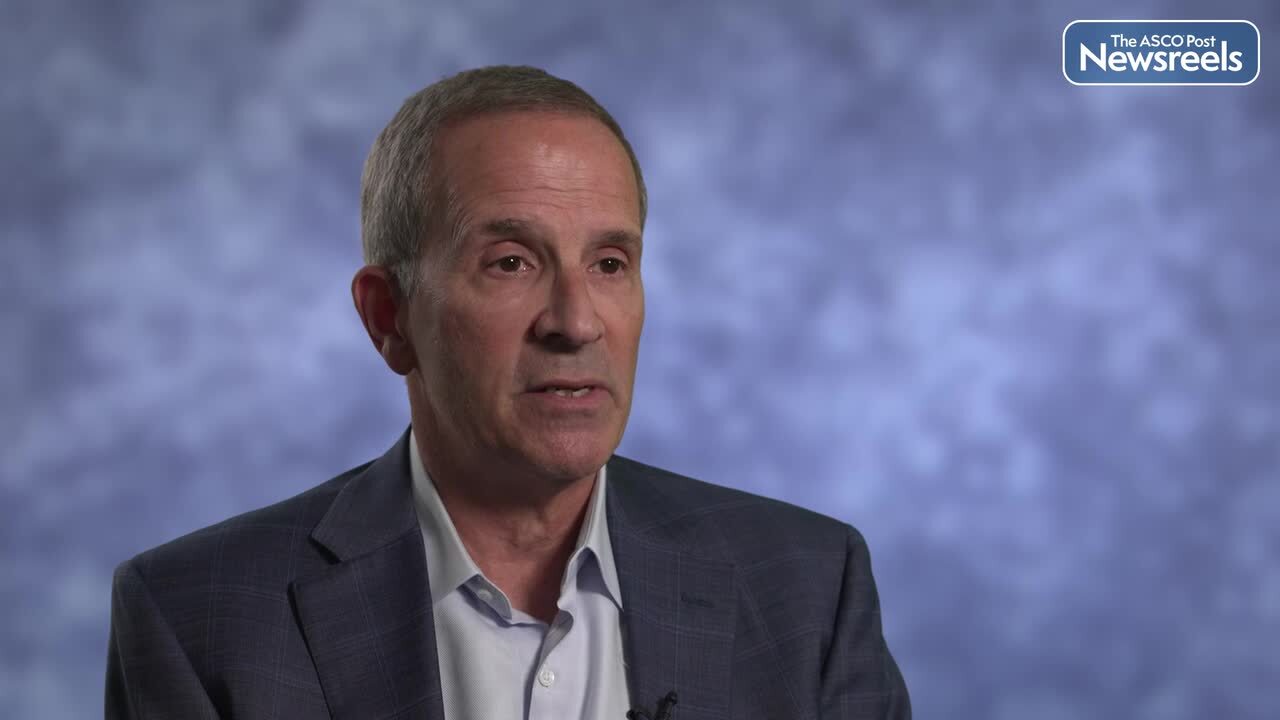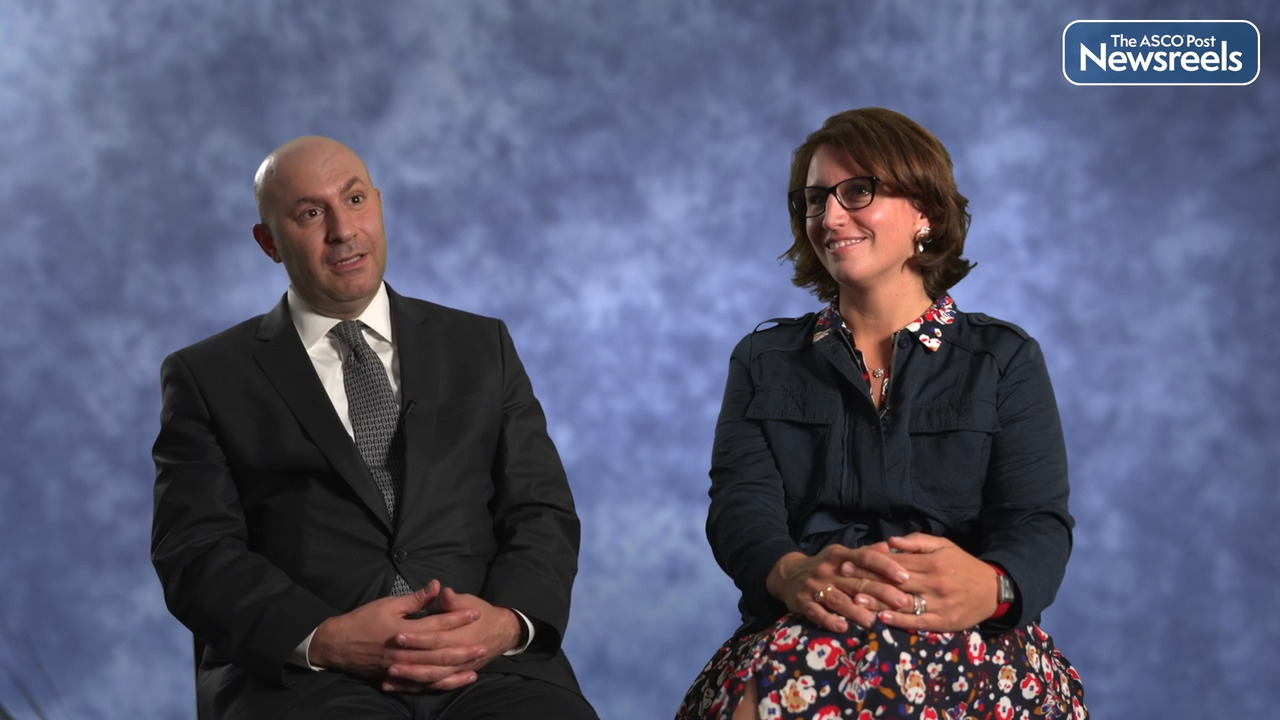Georgina V. Long, MD, PhD, on Melanoma: Findings on Circulating Tumor DNA, Disease Recurrence, and Immunotherapy
ESMO Congress 2022
Georgina V. Long, MD, PhD, of the Melanoma Institute Australia, discusses results from the CheckMate 915 trial, an analysis of the pretreatment circulating tumor DNA, along with other clinical and translational baseline factors, and their association with disease recurrence in patients with stage IIIB–D/IV melanoma treated with adjuvant immunotherapy (Abstract 788O).
Transcript
Disclaimer: This video transcript has not been proofread or edited and may contain errors.
Checkmate 915 was a trial that included patients with resected stage three B to stage four melanoma. In this trial 1,844 patients were randomized to either receive nivolumab, a standard adjuvant therapy or nivolumab combined with a low dose of ipilimumab every six weeks. The primary endpoint for this trial was the relapse free survival in the intent to treat population and a co-primary endpoint was the relapse free survival in patients with PDL one expression in their tumor, less than 1%. This trial was negative and has been previously presented and published. Despite being negative though, patients had plasma and tumor collected at baseline and furthermore plasma collected at week 13 and week 29. At ESMO 2022 I presented the results of the analysis of the circulating tumor DNA using these baseline bio specimens in all 1,127 patients were included, which represented 61% of the intent to treat population. These patients all had treatment and also had baseline tissue and plasma for analysis.
Using a patient specific, so using the patient's own tumor to identify what mutations were in their tumor and in their blood, we were able to create a patient specific panel to then detect circulating tumor DNA. We found that in the patient population where we looked at the circulating tumor DNA, the 1,127 patients, their baseline characteristics were exactly the same as that of the intent to treat population. The prevalence of circulating tumor DNA positivity in this population was 16%. We also saw that the prevalence of circulating tumor DNA was slightly higher in the higher sub stage of stage three, as well as those with a higher ECOG performance status. We did not see a higher prevalence of circulating tumor DNA in any other subgroup, including tumor mutation burden, positive or negative, patients with PDL one expression greater than or less than 1%, or BRAF mutation status although there was a slight trend to a higher circulating tumor DNA in that population.
We then analyzed the circulating tumor DNA and looked at the relapse free survival and distant metastasis free survival by the CT DNA positivity and found a very clear result with the Kaplan-Meier analysis that those with baseline positive circulating tumor DNA had a much poorer relapse free survival and a much poorer distant metastasis free survival. Importantly, the circulating tumor DNA positivity predicted early recurrence best with higher sensitivity and specificity at the early time points rather than at the later time points three months versus 24 months. Because this trial was negative, we did not see a difference in the treatment arms nivolumab versus nivolumab plus ipilimumab in terms of the circulating tumor DNA positivity and its prediction of relapse.
Lastly, we then combined the circulating tumor DNA with other tissue biomarkers, including the interferon gamma expression tumor mutation burden in the baseline tissue and found that by combining all three circulating tumor DNA and the interferon gamma and tumor mutation burden, we were much better able to predict recurrence. And had eight subgroups of patients with more accurate prediction of recurrence, the best performing group being the circulating tumor DNA negative interferon gamma baseline tissue expression high and high tumor mutation burden at baseline. Ongoing steps will be to come up with a composite biomarker analysis or predictive nomogram. And also we were looking at the circulating tumor DNA in longitudinal analysis from this trial to predict recurrence. I'd like to thank the patients and their families for their contribution to this trial.
The ASCO Post Staff
Richard S. Finn, MD, of the Geffen School of Medicine at the University of California, Los Angeles, discusses primary phase III results from the LEAP-002 study of pembrolizumab, an anti–PD-1 therapy, plus lenvatinib, the orally available multiple receptor tyrosine kinase inhibitor, vs lenvatinib monotherapy in patients with advanced hepatocellular carcinoma (Abstract LBA34).
The ASCO Post Staff
Myriam Chalabi, MD, PhD, of The Netherlands Cancer Institute, discusses data from the NICHE-2 study, which confirms previously reported pathologic responses to short-term neoadjuvant nivolumab plus ipilimumab in patients with locally advanced mismatch repair–deficient colon cancer. Survival data suggest neoadjuvant immunotherapy may become standard of care and allow further exploration of organ-sparing approaches. (Abstract LBA7).
The ASCO Post Staff
Paul A. DiSilvestro, MD, of Women & Infants Hospital and the Warren Alpert Medical School of Brown University, discusses overall survival results after a 7-year follow-up of the SOLO1/GOG-3004 trial for patients with newly diagnosed advanced ovarian cancer and a BRCA mutation who received maintenance olaparib. Dr. DiSilvestro details the increasing role of such PARP inhibitors in ovarian cancer treatment and their benefit to patients (Abstract 517O).
The ASCO Post Staff
Neal D. Shore, MD, of Carolina Urologic Research Center/Genesis Care, discusses new data from the ENACT trial, which showed that patients with prostate cancer and the RNA biomarkers PAM50 and AR-A were likely to have better outcomes with enzalutamide treatment. The results suggest that such RNA biomarkers may help to identify patients who may benefit from enzalutamide treatment compared with active surveillance (Abstract 1385P).
The ASCO Post Staff
Toni K. Choueiri, MD, of the Dana-Farber Cancer Institute, and Laurence Albiges, MD, PhD, of France’s Gustave Roussy Cancer Centre, discuss phase III findings showing that cabozantinib in combination with nivolumab and ipilimumab reduced the risk of disease progression or death compared with the combination of nivolumab plus ipilimumab in patients with previously untreated advanced renal cell carcinoma of IMDC (the International Metastatic RCC Database Consortium) intermediate or poor risk. However, the combination of cabozantinib, nivolumab, and ipilimumab vs nivolumab plus ipilimumab did not demonstrate an overall survival benefit to patients (Abstract LBA8).
